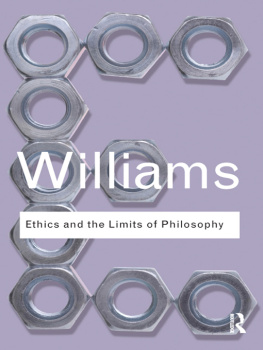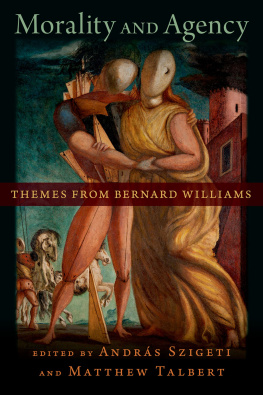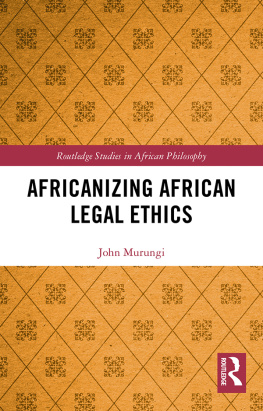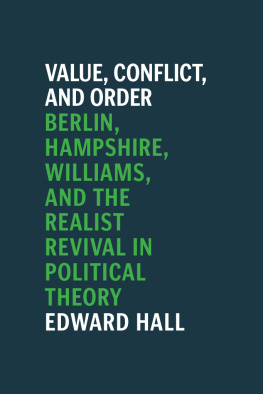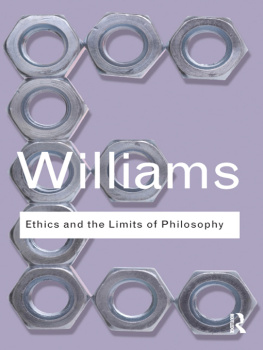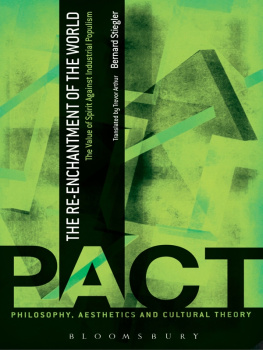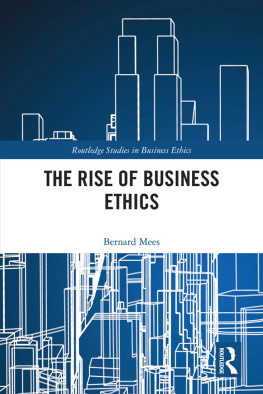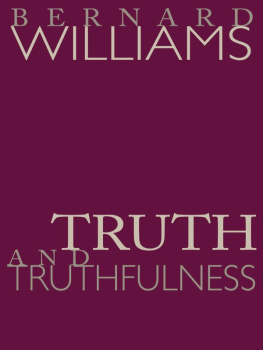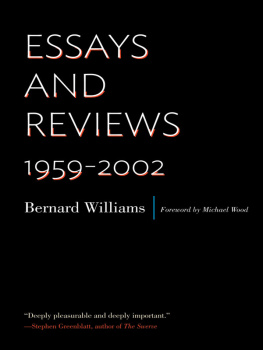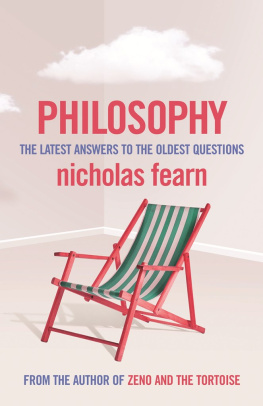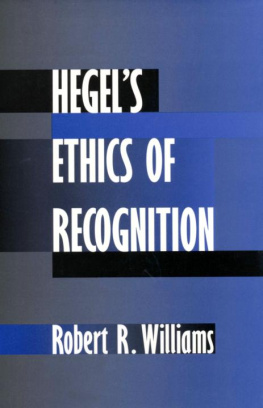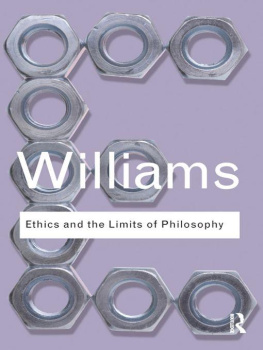Williams Bernard - Ethics and the Limits of Philosophy
Here you can read online Williams Bernard - Ethics and the Limits of Philosophy full text of the book (entire story) in english for free. Download pdf and epub, get meaning, cover and reviews about this ebook. City: London, year: 2015;2010, publisher: Routledge, genre: Science. Description of the work, (preface) as well as reviews are available. Best literature library LitArk.com created for fans of good reading and offers a wide selection of genres:
Romance novel
Science fiction
Adventure
Detective
Science
History
Home and family
Prose
Art
Politics
Computer
Non-fiction
Religion
Business
Children
Humor
Choose a favorite category and find really read worthwhile books. Enjoy immersion in the world of imagination, feel the emotions of the characters or learn something new for yourself, make an fascinating discovery.
- Book:Ethics and the Limits of Philosophy
- Author:
- Publisher:Routledge
- Genre:
- Year:2015;2010
- City:London
- Rating:5 / 5
- Favourites:Add to favourites
- Your mark:
- 100
- 1
- 2
- 3
- 4
- 5
Ethics and the Limits of Philosophy: summary, description and annotation
We offer to read an annotation, description, summary or preface (depends on what the author of the book "Ethics and the Limits of Philosophy" wrote himself). If you haven't found the necessary information about the book — write in the comments, we will try to find it.
Ethics and the Limits of Philosophy — read online for free the complete book (whole text) full work
Below is the text of the book, divided by pages. System saving the place of the last page read, allows you to conveniently read the book "Ethics and the Limits of Philosophy" online for free, without having to search again every time where you left off. Put a bookmark, and you can go to the page where you finished reading at any time.
Font size:
Interval:
Bookmark:

There are two tensions to which the argument of this book has constantly returned. In terms of philosophys questions and its centers of interest, there is a tension between ancient and modern. In actual life, the tension is between reflection and practice. I have suggested that in some basic respects the philosophical thought of the ancient world was better off, and asked more fruitful questions, than most modern moral philosophy. Although it had its own limiting concerns, such as the desire to reduce lifes exposure to luck, it was typically less obsessional than modern philosophy, less determined to impose rationality through reductive theory. The hopes for philosophy that some of those philosophers could entertain have gone, however, and the world to which ethical thought now applies is irreversibly different, not only from the ancient world but from any world in which human beings have tried to live and have used ethical concepts.
The resources of most modern moral philosophy are not well adjusted to the modern world. I have tried to show that this is partly because it is too much and too unknowingly caught up in it, unreflectively appealing to administrative ideas of rationality. In other ways, notably in its more Kantian forms, it is not involved enough; it is governed by a dream of a community of reason that is too far removed, as Hegel first said it was, from social and historical reality and from any concrete sense of a particular ethical lifefarther removed from those things, in some ways, than the religion it replaced. These various versions of moral philosophy share a false image of how reflection is related to practice, an image of theories in terms of which they uselessly elaborate their differences from one another.
It is not a paradox that in these very new circumstances very old philosophies may have more to offer than moderately new ones, and a historical story could be told to show why this is so. It would involve the coming and departure of Christianity (which helps to explain why the ancient world is nearer than it may seem) and the failures of the Enlightenment (which make its characteristic philosophies so unhelpful). Some, perhaps most, who have reached this kind of conclusionnotably Nietzsche, to the extent that he is caught by any such descriptionhave taken it to be destructive of the values of the Enlightenment; or, if not, have interpreted those values in a conservative way, like many Hegelians. I do not think we are forced to join them. A respect for freedom and social justice and a critique of oppressive and deceitful institutions may be no easier to achieve than they have been in the past, and may well be harder, but we need not suppose that we have no ideas to give them a basis. We should not concede to abstract ethical theory its claim to provide the only intellectual surroundings for such ideas.
This has been a book about what is rather than about what might be, and the hopes I have expressed are, for now, hopes. They rest on assumptions that some people will think optimistic. They can be compressed into a belief in three things: in truth, in truthfulness, and in the meaning of an individual life. I shall end by saying something briefly about each.
I have claimed that the natural sciences, at least, are capable of objective truth. The error of people who deny this characteristically expresses itself in a misplaced rhetoric of comfort. They say that those who believe that science can tell us how the world really is are superstitiously clutching on to science, in a desperate faith that it is the only solid object left. But equally one may say that comfort is being sought in the opposite direction, and that skepticism against science serves, as it did in the seventeenth century, to warm those whose own claims to knowledge or rational practice look feeble by comparison. The idea that modern science is what absolute knowledge should be like can be disquieting, and it can be a relief if one represents science as merely another set of human rituals, or as dealing with merely another set of texts.
These claims about what provides comfort or takes it away can be made in any direction one likes, and none of them is in the least interesting. What matters more, and may have something to do with comfort or with optimism, is how far notions of objective truth can be extended to social understanding. As I mentioned in , it need not seek to join the natural sciences in providing an absolute conception of the world, but we need to have some reflective social knowledge, including history, that can command unprejudiced assent if the better hopes for our self-understanding are to be realized. We shall need it if we are to carry out the kind of critique that gives ethical insight into institutions through explanations of how they work and, in particular, of how they generate belief in themselves. It is worth repeating here something that has come out at various points in the discussion of positive ethical theory: it should not suppose that it can do without such social understanding, or that by a pure moralistic stand it can detach itself from these issues. It needs this understanding in order to answer questions about itself that it cannot ultimately avoid, about its relations to social life, its social or psychological connections with practice, and the ways in which it might hope to turn its supposed rational authority into power.
The hope for truthfulness, next, is essentially that ethical thought should stand up to reflection, and that its institutions and practices should be capable of becoming transparent. I have tried to say why ethical thought has no chance of being everything it seems. Even if ethical thought had a foundation in determinate conceptions of well-being, the consequences of that could lie only in justifying a disposition to accept certain ethical statements, rather than in showing, directly, the truth of those statements: but this is not how it would naturally appear to those who accepted them. Moreover, it is unlikely that we can achieve this foundation.
While ethical thought will never entirely appear as what it is, and can never fully manifest the fact that it rests in human dispositions, this will present greater obstacles to reflection in some conditions of ethical thought than in others. One thing that will make a difference is the extent to which ethical life can still rely on what I have called thick ethical concepts. They are indeed open to being unseated by reflection, but to the extent that they survive it, a practice that uses them is more stable in face of the general, structural reflections about the truth of ethical judgments than a practice that does not use them. The judgments made with these concepts can straightforwardly be true, and, for the people who have those concepts, the claim involved in assenting to them can correspondingly be honored.
I hope I have made it clear that the ideal of transparency and the desire that our ethical practice should be able to stand up to reflection do not demand total explicitness, or a reflection that aims to lay everything bare at once. Those demands are based on a misunderstanding of rationality, both personal and political. We must reject any model of personal practical thought according to which all my projects, purposes, and needs should be made, discursively and at once, considerations for me. I must deliberate from what I am. Truthfulness requires trust in that as well, and not the obsessional and doomed drive to eliminate it.
How truthfulness to an existing self or society is to be combined with reflection, self-understanding, and criticism is a question that philosophy, itself, cannot answer. It is the kind of question that has to be answered through reflective living. The answer has to be discovered, or established, as the result of a process, personal and social, which essentially cannot formulate the answer in advance, except in an unspecific way. Philosophy can play a part in the process, as it plays a part in identifying the question, but it cannot be a substitute for it. This is why it is a misunderstanding to ask, in the way that ethical theorists often ask, what alternative one has to their formulations. They mean, what formulation does one have as an alternative to their formulations, either of the answer or of some determinative heuristic process that would yield the answer; and there is none. There might turn out to be an answer to the real question, and this would indeed be an alternative to their formulations; but it would not be an answer produced in the way that their demand requires an answer, as a piece of philosophy. To suppose that, if their formulations are rejected, we are left with nothing is to take a strange view of what in social and personal life counts as something.
Font size:
Interval:
Bookmark:
Similar books «Ethics and the Limits of Philosophy»
Look at similar books to Ethics and the Limits of Philosophy. We have selected literature similar in name and meaning in the hope of providing readers with more options to find new, interesting, not yet read works.
Discussion, reviews of the book Ethics and the Limits of Philosophy and just readers' own opinions. Leave your comments, write what you think about the work, its meaning or the main characters. Specify what exactly you liked and what you didn't like, and why you think so.

